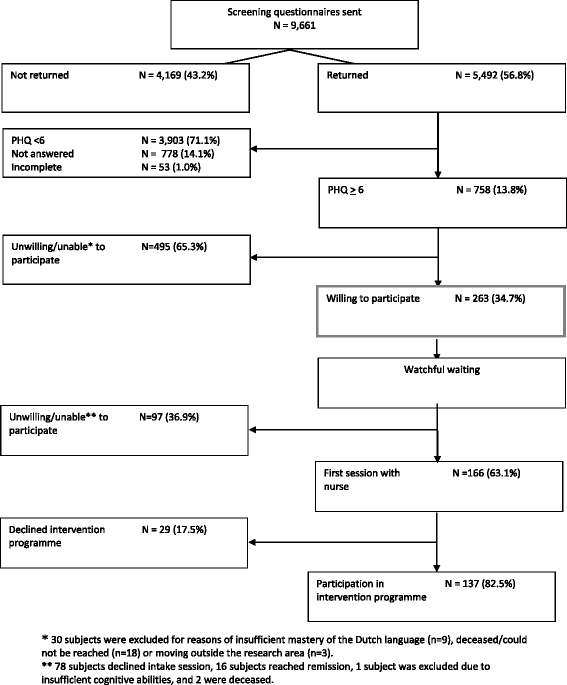Implementing an outreaching, preference-led stepped care intervention programme to reduce late life depressive symptoms: results of a mixed-methods study
- PMID: 25163984
- PMCID: PMC4156632
- DOI: 10.1186/s13012-014-0107-y
Implementing an outreaching, preference-led stepped care intervention programme to reduce late life depressive symptoms: results of a mixed-methods study
Abstract
Background: Depressive symptoms are highly prevalent in old age, but they remain mostly untreated. Several clinical trials have shown promising results in preventing or reducing depressive symptoms. However, it is not clear how robust these effects are in the real world of day-to-day care. Therefore, we have implemented the 'Lust for Life' programme, which significantly reduced depressive symptoms in community-dwelling older adults in the first three months after implementation. This mixed-methods study was conducted alongside the trial to develop a contextualised understanding of factors affecting the implementation.
Methods: A total of 263 persons of 65 years and older with depressive symptoms were recruited from 18 general practices and home care organizations in the Netherlands. We used qualitative data (in-depth interviews and focus group discussions with participants with depressive symptoms and healthcare professionals) as well as quantitative data (longitudinal data on the severity of depressive symptoms) to explore hindering and facilitating factors to the implementation of the 'Lust for Life' programme.
Results: The uptake of the routine screening was poor and imposed significant burdens on participants and healthcare professionals, and drop-out rates were high. Participants' perceived mental problems and need for care played a key role in their decision to participate in the programme and to step up to consequent interventions. Older people preferred interventions that focused on interpersonal contact. The programme was only effective when delivered by mental healthcare nurses, compared to home care nurses with limited experience in providing mental healthcare.
Conclusions: The intervention programme was effective in reducing depressive symptoms, and valuable lessons can be learned from this implementation trial. Given the low uptake and high investment, we advise against routine screening for depressive symptoms in general healthcare. Further, agreement between the participant and healthcare professional on perceived need for care and intervention is vital. Rather than providing a stepped care intervention programme, we showed that offering only one single preference-led intervention is effective. Lastly, since the provision of the interventions seems to ask for specific skills and experiences, it might require mental healthcare nurses to offer the programme.
Trial registration: Dutch trial register NTR2241.
Figures
References
-
- Vos T, Flaxman AD, Naghavi M, Lozano R, Michaud C, Ezzati M, Shibuya K, Salomon JA, Abdalla S, Aboyans V, Abraham J, Ackerman I, Aggarwal R, Ahn SY, Ali MK, Alvarado M, Anderson HR, Anderson LM, Andrews KG, Atkinson C, Baddour LM, Bahalim AN, Barker-Collo S, Barrero LH, Bartels DH, Basanez MG, Baxter A, Bell ML, Benjamin EJ, Bennett D, et al. Years lived with disability (YLDs) for 1160 sequelae of 289 diseases and injuries 1990–2010: a systematic analysis for the Global Burden of Disease Study 2010. Lancet. 2012;380:2163–2196. doi: 10.1016/S0140-6736(12)61729-2. - DOI - PMC - PubMed
Publication types
MeSH terms
Associated data
LinkOut - more resources
Full Text Sources
Other Literature Sources
Medical





